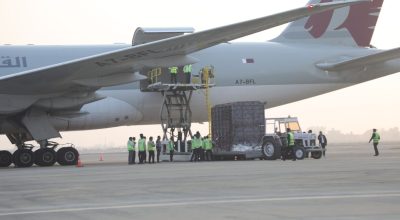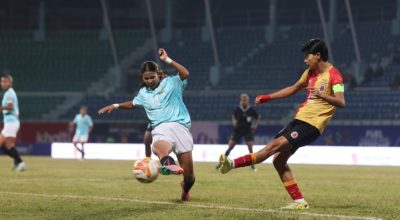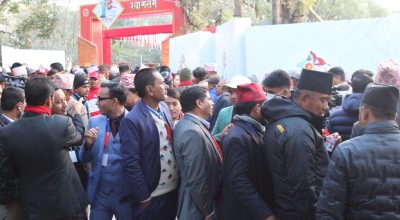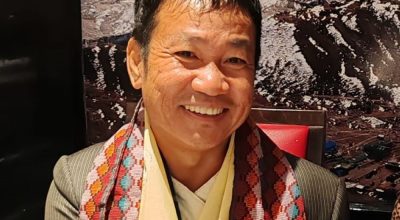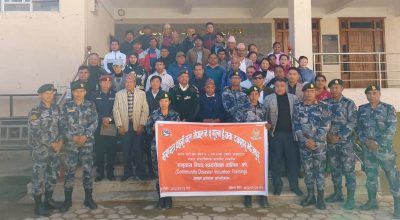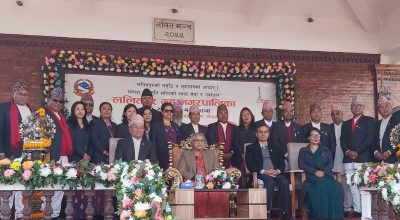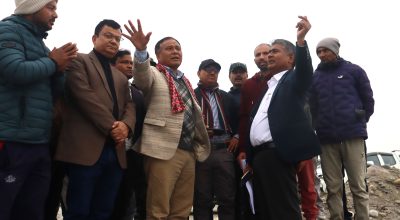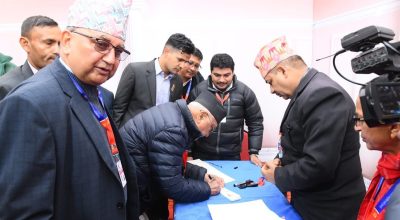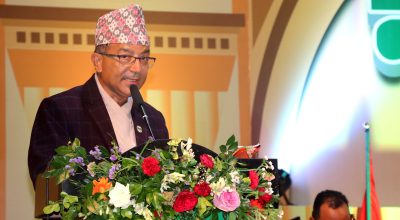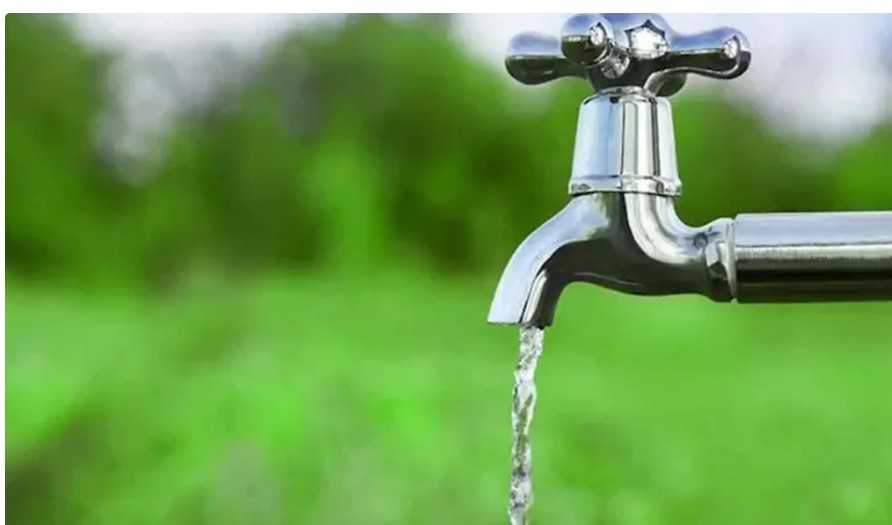
Raj Kumar Parajuli
Kavre, Aug 17: Over half a dozen drinking water projects have been launched in Kavrepalanchok district with some already finished while others near completion. One of them the Kavre Valley Integrated Water Project is currently under trial operation.
Under the testing phase for the project, its water has been distributed to Sharadhadevisthan of Panauti. It takes some months to operate the project in its full capacity, said the project officials. The project targets distributing water to around 93,000 residents of Banepa, Dhulikhel and Panauti cities of the district.
Physical infrastructure construction has been over while pressure and leakage test is being done on the pipes laid for the water distribution.
The project will be fully complete in some months, said the Banepa Municipality Mayor Shanti Ratna Shakya. “We are testing the water distribution after identifying technical glitches.” The project had to be completed five months ago. But negligence of the contractor is to blame for the delay, he said, adding that the project will be over in four months if work continues unhindered.
Kavrepalanchok, August 17: A series of vital drinking water initiatives have been initiated in Kavrepalanchok district, with some already finished and others approaching completion. Among these, the Kavre Valley Integrated Water Project is currently undergoing testing phases.
In this trial period, the water is being channeled to Sharadhadevisthan of Panauti. As the project enters its conclusive stages, there is an anticipation of a few more months before water distribution can commence seamlessly, as per statements from project officials. The primary objective of this initiative is to provide water access to approximately 93,000 residents residing in Banepa, Dhulikhel, and Panauti cities within the district. The physical infrastructure construction has reached completion, and the current focus lies on conducting pressure and leakage tests on the laid pipelines designated for water distribution.
Following the completion of the project, residents of the three cities will get safe drinking water, said the Dhulikhel Municipality Mayor Ashok Byanju. “Now, in some months, the citizens of the three cities will get safe water. It is a matter of joy,” he said.
The Government of Nepal started the project around 12 years ago with 50 percent loan from the Asian Development Bank. The project cost was Rs 1 billion. Started with two years of the completion target, the project expanded many times in between due to various reasons. The project is considered the second biggest of the country behind the Melamchi Water Project, said Byanju.
Similarly, the Panchkhal Urban Water and Sanitation Project has been expedited with the aim of meeting the completion target of remaining five months, said the project officials. The project deadline was extended additional one year. It aims to provide the water to around 7,000 families of 10 of 13 wards of Panchkhal. Started on 29 August, 2019, the project had to be completed within December, 2022. Factors like COVID-19 and a lack of construction materials are to blame for the delay. The project was contracted with the Huawei Kankai JV at the cost of Rs 1.34 billion. As par the agreement, five percent of the total cost (Rs 110 million) had been collected from consumers.
Around 85 percent of the construction has been completed, and the water is being tested at some areas, it has been said. It is pumping 84 litres of water per second as per the preliminary target, said the consumers’ committee chair Kumar Lamichhane, adding that 302,400 litres of water can be easily pumped per hour. Over 6.4 million litres of water is pumped every 20 hours a day. At the present speed rate, each tap gets 1001 litres water every day. Each person is projected to consume 192.5 litres of water daily.
The Temal water project is another project being fully concluded in next three months. The project aims to distribute safe water to around 55,000 people of Temal area. The project has reached its final state with the completion of the laying of the water pipelines and the installation of taps, said the consumers’ committee. The actual completion deadline of the project was one year ago. But factors like COVID-19 and natural disasters are accused of causing the delay.
“Work is underway with the aim of regularly distributing the water in eight months,” said the committee chair Sangramjeet Lama. The water has been already tested. At present, the water has been distributed to around 900 houses at Sasyukharka and Aadhabata of Temal Rural Municipality-1, Chapkhori of the ward-7, Yangbel of the ward-5, and Kottemal and Kalimati of Namobuddha Municipality-5, he said.
Additionally, efforts are on to distribute the water to 110 families of Katunje of Roshi Rural Municipality-7, it has been said. Two tanks with capacity of 400,000 litres each have been installed in the Yangbel hill. As per the agreement reached in 2072 BS, Rs the Department of Water Supply and Sewerage Management provided Rs 1.2 billion, and the rural municipality contributed one percent of labour and the local people nine percent. Under the project, structures have been built for pumping the water at an elevation of 12 kilometers from the Sunkoshi river.
The Mandan Deupur Water Supply Project is under construction. Started in 2078 BS with the three years of the completion target, the project is being completed within this year, said the consumers’ committee chair Ram Bahadur Tamang. Around 75 percent of work has been over, he said.
Under the project, the water is pumped from the Indrawati river and distributed to nine of 12 wards of Mandan Deupur. For the Rs 1 billion project, the Department of Water Supply and Sewerage Management provided Rs 960 million, and the remaining funds were collected from the local people and the local level. The water is released into the main reservoir 13.5 litres per second.
Under the ‘one house one tap’, the water has been provided to around 500 families of Bhugdeu of Bethan Chowk Rural Municipality-6 following the completion of the Mahankalchaur water and sanitation project and the Thingchhap water project. The two projects took place in collaboration between Bethanchowk Rural Municipality and the Nepal Water for Health (NEWAH).
Approximately 223 families of Bethanchowk Rural Municipality-6 have been directly benefited from the Bhanjyang Kharka water project.
The Kashikhanda water project is under construction with the aim of providing water to the local people of Namobuddha Municipality-7, 8 and 9. The water is pumped from the Roshi river into a tank at the hill of Kalikuwa, around over six kilometers away.
The tank has capacity of storing 200,000 litre water. The project that was contracted at over Rs 184 million is expected to provide the water to 1,500 houses to three wards of the municipality, said the project chairperson Manoj Adhikari.
Once all the projects come into full operation, and with other already operational water projects, around 80 percent of the population of the district are estimated to get clean water.
“Around 80 percent houses have got water facility. Plan will be formulated to provide the facility to the remaining,” said lawmaker and former minister Gokul Prasad Banskota, who won the House of Representative seat from Kavrepalanchok district in the erstwhile elections. Some projects will be repaired for resumption, he said.
Around 60 percent of drinking water distributed by various projects is found polluted, according to the district health office. Fecal coliform has been detected in a sample of drinking water distributed to many areas of the district, said the office chief Dr Purushottam Sedain. “The drinking water has been tested polluted in half local levels of the district,” he said.
During the monitoring, the water was found contaminated at the water sources, it has been said. RSS






